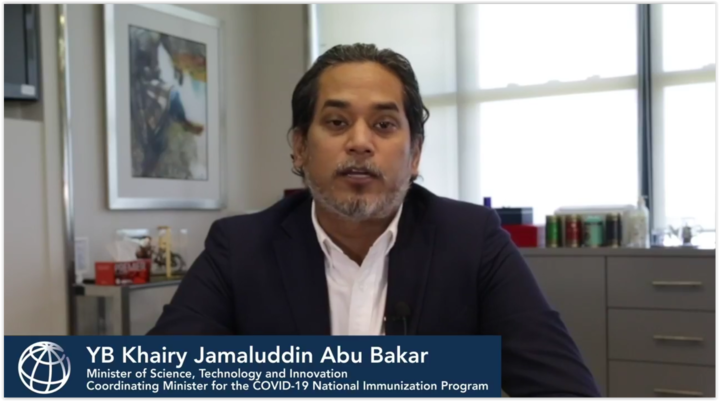KUALA LUMPUR, June 23 — Khairy Jamaluddin today slammed global vaccine inequity in the Covid-19 pandemic, accusing United Nations-backed vaccine sharing programme COVAX of failing to supply shots to developing countries.
The vaccine minister said while Malaysia appreciated Covid-19 vaccine donations from developed countries that are scheduled to arrive in the coming weeks, he criticised those nations for cornering the vaccine market in the past few months.
“I think the World Bank has the responsibility to bring the voice of the developing world in raising what I think is extremely, extremely immoral, and that is the hoarding of vaccines by the industrialised countries,” Khairy said at the launch of the World Bank’s 24th Malaysia Economic Monitor: “Weathering the Surge” report today.
“We set up COVAX in global solidarity as a mechanism to ensure vaccine equity and that has been an abysmal failure.
“I think the World Bank owes it to developing countries to be a strong voice for vaccine equity on the global stage to remind the rich advanced countries that what has taken place over the last few months has fallen short of respectable and responsible global leadership.”
The United States embassy said recently that US president Joe Biden earlier this month announced that the US would donate seven million Covid-19 vaccine doses to Asian countries, including Malaysia, out of the 80 million doses the US is contributing to COVAX. The US’ commitment only came after vaccinating more than half of its population with at least one dose.
A report published in The Lancet last June 19 quoted Gavin Yamey from Duke University, who was part of a working group for COVAX — managed by Gavi, the Vaccine Alliance — as describing COVAX as a “beautiful idea, born out of solidarity” that did not materialise as “rich countries behaved worse than anyone’s worst nightmares”.
The medical journal reported that UN secretary general António Guterres said at the pledging summit for COVAX last June 2 in Japan that 10 countries have administered 75 per cent of all Covid-19 vaccines. Of the 2.1 billion coronavirus vaccine doses administered globally so far, COVAX has been responsible for less than 4 per cent.
According to The Lancet, the US had made seven bilateral deals with six companies by August last year for over 800 million Covid-19 vaccine doses, enough to vaccinate 140 per cent of its population.
The European Union had access to half a billion doses secured through two deals, while the United Kingdom secured access to 270 million doses, enough for 225 per cent of its population, in five bilateral agreements.
These huge early investments by rich countries in multiple Covid-19 vaccines — before knowing whether the experimental shots would actually work — pushed them to the front of the queue ahead of COVAX that did not have the means to compete.
COVAX originally intended to share vaccines across the globe by having high-income countries pay for their own vaccines, while doses for 92 lower-income countries would be financed through donor aid.
“Three dozen countries bypassed COVAX and made huge deals directly with manufacturers,” Yamey was quoted saying. “And since they cleared the shelves, there were not enough doses left for COVAX.”
To date, Malaysia has only received 828,000 vaccine doses from COVAX — all of which are AstraZeneca-Oxford shots — just 12.9 per cent of the 6.4 million doses ordered from the COVAX Facility.
Malaysia is scheduled to receive 1.39 million AstraZeneca vaccine doses from COVAX out of the 6.4 million order, with the remaining requested shots comprising the Johnson & Johnson and Novavax vaccines.
As an upper-middle income country, Malaysia paid for Covid-19 vaccines procured through COVAX by joining the Optional Purchase arrangement that enables participating economies to choose which vaccines to buy.
While Khairy’s criticism of rich countries hoarding vaccines is valid, Malaysia arguably joined COVAX late, officially signing up only on November 25, two months behind Singapore and Brunei.
In his speech at the World Bank session today, Khairy said the Malaysian government’s vaccination strategy was to ensure as many residents in Malaysia as possible get vaccinated to save lives in the fastest possible time.
The science, technology and innovation minister also said the government is rapidly increasing Covid-19 vaccination centres, including targeting an additional 1,000 private general practitioners by the end of this and next month, as well as getting retired health workers, housemen, and medical students to administer jabs.
Khairy added that Malaysia plans to implement a National Vaccine roadmap to prepare for a post-pandemic world.
“Malaysians need to acquire the ability to produce test kits and successfully conduct research on vaccines and perform clinical trials to complement our local capabilities. International cooperation that can increase knowledge and technology adoption can further our goals in the medium to long term.”








